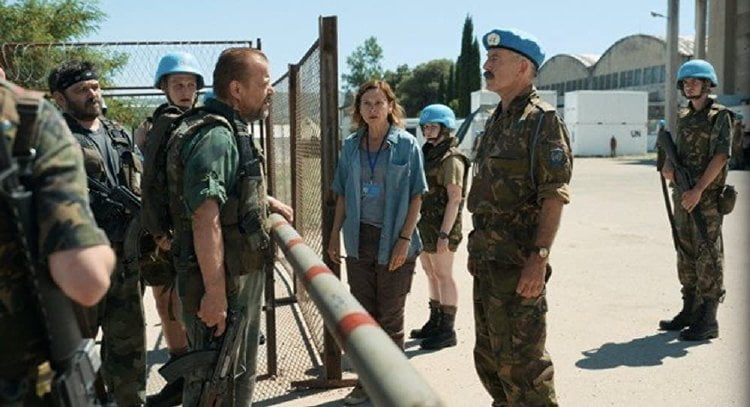QUO VADIS, AIDA?
(director/writer: Jasmila Zbanic; cinematographer: Christine A. Maier; editor: Jaroslaw Kominski; music: Antoni Komasa-Lazarkiewicz; cast: Jasna Djuricic (Aida Selmanagic), Izudin Bajrovic (Nihad), Boris Ler (Hamdija), Johan Heldenbergh (Colonel Karremans), Raymond Thiry (Major Franken), Boris Isaković (Gen. Ratko Mladic), Dino Barjović (Sejo); Runtime: 101; MPAA Rating: NR; producers: Damir Ibrahimovic, Jasmila Zbanic; Curzon Home Cinema; 2020-Bosnia and Herzegovina/Austria/Romania/Netherlands/Germany/Poland/France/Norway/Turkey–in Bosnian, English and Dutch, with English subtitles)
“Shocking and powerful historical genocide drama.”
Reviewed by Dennis Schwartz
Jasmila Zbanic (“On The Path”/”Love Island”), who was born in Sarajevo, Bosnia and Herzegovina, Yugoslavia, is the director/writer of this shocking and powerful historical genocide drama based on a true story. Her film tells the brutal tale of what happened on July 1995, during the final months of the Bosnian War, when Bosnian Serb soldiers, under the command of the ruthless Gen. Ratko Mladic (Boris Isaković), massacred 8,000 Bosnian Muslim boys and men in what was called the Srebrenica Genocide, who were sheltering in a so-called UN “safe area,” under the guard of the Dutch UN peacekeeping soldiers in powder-blue helmets, led by the inept Colonel Karremans (Johan Heldenbergh). The UN troops had been unable to stop the massacre by the seething with venom Serbs. Of note, this was the biggest civilian atrocity in Europe since the second World War.
The massacre is seen through the eyes of a UN translator, Aida Selmanagic (Jasna Djuricic), moving between the different ethnic factions, who is pictured (in a number of flashbacks) with her headteacher husband Nihad (Izudin Bajrovic) and their two teenage sons Hamdija (Boris Ler) and Sejo (Dino Bajrovic).
It’s a sad but beautifully made film that pours its heart out for the victims of the slaughter and hopes by showing the past as brutally as it was, these atrocities no longer will happen in the future. The touching film closely examines how the ball was fumbled by the UN peacekeepers, and how the world was stunned by the genocide. It shows that Aida (in a riveting performance) had a close-up view of the action and during the trying time of the attack, despite panicking, must find protection for her vulnerable family who were in the crowd and without the same pass to the camp that she had.
It was selected by Bosnia and Herzegovina as their foreign language Oscar nomination.

REVIEWED ON 3/22/2021 GRADE: A-